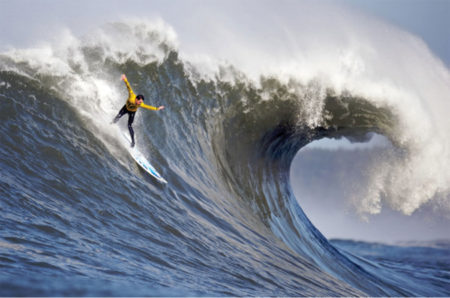Seven Ways Surfing is like Playing Poker
 I’ve had a good run of both surfing and poker in Costa Rica lately, and while watching the Pipe Masters online I had time to reflect on two of my favorite hobbies. Both I had learned to do at a young age and when I do either activity there is a connection to my dad. He was a Navy Diver so I grew up by the coast and we have sailed, snorkeled, or swam a large swath of the East Coast. He also had taught me poker and chess, and he still plays some online home games to keep his mind sharp (although my mom has been winning the tournaments lately).
I’ve had a good run of both surfing and poker in Costa Rica lately, and while watching the Pipe Masters online I had time to reflect on two of my favorite hobbies. Both I had learned to do at a young age and when I do either activity there is a connection to my dad. He was a Navy Diver so I grew up by the coast and we have sailed, snorkeled, or swam a large swath of the East Coast. He also had taught me poker and chess, and he still plays some online home games to keep his mind sharp (although my mom has been winning the tournaments lately).
 Both surfing and poker have histories going back over 500 years, but the poker I’m talking about is Texas No-Limit Holdem, not your play money, five card game where threes and one-eyed Jacks are wild. Here are seven ways they are similar to me. Maybe you can think of a few more?
Both surfing and poker have histories going back over 500 years, but the poker I’m talking about is Texas No-Limit Holdem, not your play money, five card game where threes and one-eyed Jacks are wild. Here are seven ways they are similar to me. Maybe you can think of a few more?
Surf breaks and players can both be categorized, but no two waves or hands dealt are exactly the same.
Some will pound you while others you know will let you off easy. Some are easy to read, you know what they are going to do every time. Both can be unpredictable. Waves and cards can start out easy and then turn murky at the river. You have to go into each with a plan of action, but be ready to change course with the cards dealt to you. And after each session you take what you’ve learned and apply it to the next one, remembering it is all part of the bigger picture.
They are played in exotic locations.
Australia—check. South Africa—check. Asia—check. The Caribbean—check. Florida and California—more venues than you can shake a stick at. The players in both games will spend a lot of money traveling to new and foreign locations, where the locals speak many languages. The accommodations closest to the venue are generally overpriced, but closest to the action. If you are on a budget, you can crash on a friend’s sofa. When you go a new spot, the locals give you this look like they are going to take all—your chips or your waves.
The old timers get respect—sometimes.
Shaun Tomson, Tom Curren, The Duke, and Doyle Brunson. Legends that live and play their sport to the end. It keeps them young, their mind sharp. They are searching for the double up and know where to sit in order to find it. When they leave us, their stories and glories are retold by their families and friends, and annual events and charitable fundraisers are hosted in their honor. But if you didn’t know who they were then you just look at them and play your game, hoping they stay out of your way. This can be at the poker table or in the lineup.
The young risk takers rule the lineup.
These days you visit a surf break or poker room and the youth are out in droves. Gratefully the casinos don’t let in kids under 18, or you’d be going all in with an 8 year old wizard with nothing but a trust fund to lose. In surfing they sit the deepest, play recklessly, and compete more for their share of the scraps, while the older surfers wait for the big pots. It’s interesting to note that inexperienced poker players are called ‘fish’, which are taken advantage of by the ‘sharks’, and those who buy in big but can’t play are called ‘whales’.
There are pros in both sports.
Most surfers and poker players do it for recreation, but some are very competitive even when not in a tournament. You can win a lot of money but the sponsors don’t pay. Only the top professionals get any type of big endorsements. It could be a clothing company, an entertainment company, possibly some upstart that makes sunglasses. Their logos are splayed on their body like tattoos, on hats and shirts. There is a tour, and sometimes it feels like a grind, especially when they don’t win their draws. The men outnumber the women, and the women’s prize money just doesn’t stack up (until just last year on the World Championship Surf Tour where Men’s and Women’s prizes are equal) If you do it for a living, you’ll read every single sports publication related to it to make sure you stay ahead of the game and know what everyone else is up, too.
It can be fun to be a spectator.
If you are not a pro but still like the sport, it’s just fun to watch the professionals compete. It’s not your money invested in the tournament, it’s not your boards that are getting broken. These guys (and girls) take risks that you wouldn’t do. The announcers know the game, but sometimes they drone on when there isn’t a lot of action. The fans cheer their favorite competitors. There is always an element of luck involved in catching cards or catching waves, and your hometown hero can be the next champ.
With big rewards are big risks.
Have you ever made a bet that would cost you $1 million dollars? Or maybe it would cost you your rent. Hopefully it won’t cost you your life, but if it does then you are in WAY too deep. You do more than you expect to play the game, and make sacrifices. And when you are dropping into a wave, you can’t hesitate. It’s all in or nothing. Yeah, you can glide and think to yourself you do it just out of enjoyment, but you’ll get injured in the pocket if you are not 100% focused. What you are enjoying is the rush of adrenaline—how your mind stops thinking of everything else but the task at hand. A big bet provides the same adrenaline as dropping in on a big wave, and experience gives you more confidence to make that drop.
I think that we are all in the right place at the right time almost every day. It’s the people who are prepared to be lucky who can take advantage of being there.
Phil Hellmuth, 1989 World Series of Poker Champion
It’s like the mafia. Once you’re in, you’re in. There’s no getting out.
Kelly Slater, 11x Surfing Champion
Fear causes hesitation, and hesitation will cause your worst fears to come true.
Patrick Swayze, from the movie Point Break
